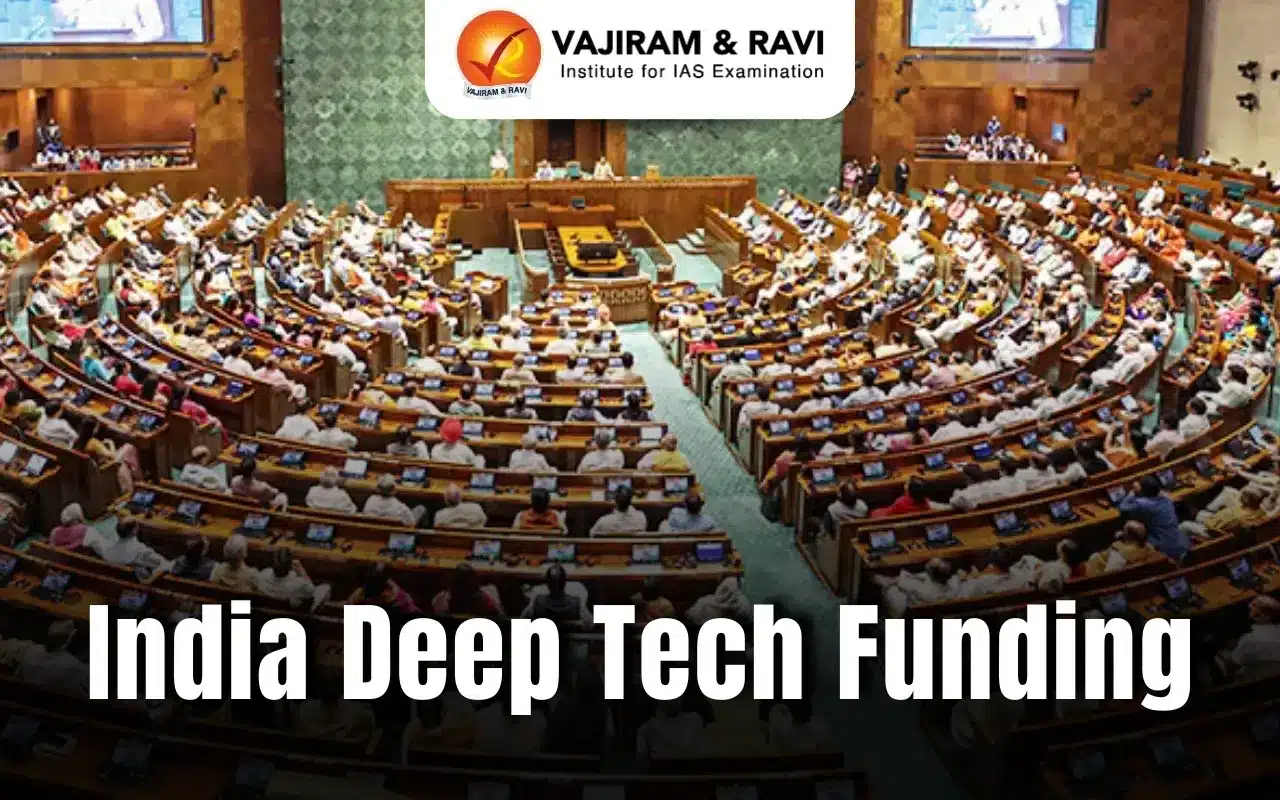What’s in Today’s Article?
- India Deep Tech Funding Latest News
- Deep Tech
- Evolution of India’s Deep Tech Ecosystem
- Parliamentary Panel Flags Concerns Over ₹20,000 Cr Deep Tech Fund
- India Deep Tech Funding FAQs
India Deep Tech Funding Latest News
- A Parliamentary Standing Committee has raised concerns over the Government’s plan to allocate ₹20,000 crore as a 50-year interest-free loan to deep tech sectors.
- While acknowledging the initiative’s potential to boost research, the committee warned of possible fund misallocation, national security risks, and a low return on investment.
Deep Tech
- Deep Tech refers to advanced and disruptive technologies that rely on significant scientific and engineering breakthroughs.
- These innovations often require long-term research and development and have the potential to create transformative changes across industries such as healthcare, defense, artificial intelligence, and biotechnology.
Examples
- Artificial Intelligence (AI) & Machine Learning – Self-learning algorithms, autonomous systems.
- Quantum Computing – High-speed computation beyond classical computing limits.
- Biotechnology & Genetic Engineering – CRISPR gene editing, personalized medicine.
- Semiconductors & Advanced Materials – Nanotechnology, graphene-based materials.
- Aerospace & Defense Technologies – Hypersonic vehicles, advanced missile systems.
- Renewable Energy & Battery Technologies – Solid-state batteries, hydrogen fuel cells.
Key Features
- High Research & Development Intensity – Requires deep scientific knowledge and long-term investment.
- Disruptive Innovation – Capable of significantly transforming industries.
- High-Risk, High-Reward – Often uncertain in early stages but can yield substantial economic and strategic benefits.
- Interdisciplinary Approach – Combines multiple fields such as AI, biotech, and quantum physics.
Evolution of India’s Deep Tech Ecosystem
- India’s DeepTech ecosystem is growing rapidly, though still in its early stages compared to global markets.
- According to NASSCOM’s report “India’s DeepTech Dawn: Forging Ahead”, the country had over 3,600 DeepTech startups, with 480 launched in 2023—double the number from 2022.
- While India ranks as the third-largest startup ecosystem globally, its DeepTech sector stands at the 6th position.
Government Policies and Investments Driving Growth
- The Indian government is actively promoting DeepTech through key initiatives, including:
- Draft National DeepTech Start-up Policy – Aimed at fostering innovation.
- ₹1 Lakh Crore Corpus (Interim Budget 2024) – To boost research and development.
- ₹1,000 Crore Venture Capital Fund for the Space Sector – Supporting space-tech startups.
- National Quantum Mission (2023) – Investment in quantum computing and communications.
- India AI Mission – Strengthening AI research, innovation, and startups.
- Othe Initiatives like the Atal Innovation Mission, NITI Aayog’s programs, and Start-up India are providing support through accelerators and incubators.
Union Budget 2025-26 and Deep Tech
- Research, Development and Innovation – ₹20,000 crore to be allocated to implement private sector driven Research, Development and Innovation initiative announced in the July Budget.
- Deep Tech Fund of Funds – Deep Tech Fund of Funds to be explored to catalyze the next generation startups.
- It also unveils key initiatives for the tech sector, such as enhanced India AI mission funding, an AI Centre of Excellence for Education etc.
Parliamentary Panel Flags Concerns Over ₹20,000 Cr Deep Tech Fund
- A Parliamentary Standing Committee has raised concerns over the Government’s ₹20,000 crore interest-free loan scheme for deep tech sectors, warning that private entities could benefit disproportionately at the government’s expense.
- It also questioned the ability of fund managers to select impactful projects and suggested that directing funds to government institutions could have yielded better outcomes.
Underutilisation of Funds in Scientific Research
- The committee noted that the Department of Scientific and Industrial Research had not fully utilised its budget.
- Over half of the allocated funds remaining unused as the financial year nears its end.
- It supported an additional allocation of ₹363.9 crore but flagged that 62% of the department’s budget was spent on salaries and pensions, leaving only 31% for research, which limits infrastructure development and innovation.
Concerns Over Biotechnology PSUs
- The committee expressed concern over the poor state of two public sector undertakings under the Department of Biotechnology—BIBCOL and IVCOL.
- It stressed the importance of reviving these PSUs to ensure affordable vaccine availability and strengthen India’s position in the global vaccine market.
- The committee recommended securing revival packages to enable these PSUs to support vaccine exports and enhance self-reliance in vaccine production.
Recommendations for Policy Framework
- The panel urged the government to address these concerns while formulating guidelines for the deep tech fund, ensuring transparency, accountability, and effective allocation to maximize national benefits.
India Deep Tech Funding FAQs
Q1. What is India’s ₹20,000 Cr deep tech initiative?
Ans. A government-backed scheme offering interest-free loans to boost deep tech research and innovation in emerging technologies.
Q2. Why is there concern over the deep tech fund’s allocation?
Ans. Experts fear private firms may benefit disproportionately, while fund mismanagement could limit real research impact.
Q3. How is deep tech crucial for India’s growth?
Ans. Advanced tech like AI, quantum computing, and biotech can drive innovation in defense, healthcare, and energy sectors.
Q4. What are the panel’s recommendations for fund management?
Ans. Strengthen transparency, direct funds to public research institutions, and ensure better selection of impactful projects.
Q5. How does underutilization of research funds affect innovation?
Ans. Budget inefficiencies limit infrastructure, slowing down scientific progress and reducing India’s global competitiveness in deep tech.
Last updated on June, 2025
→ UPSC Notification 2025 was released on 22nd January 2025.
→ UPSC Prelims Result 2025 is out now for the CSE held on 25 May 2025.
→ UPSC Prelims Question Paper 2025 and Unofficial Prelims Answer Key 2025 are available now.
→ UPSC Calendar 2026 is released on 15th May, 2025.
→ The UPSC Vacancy 2025 were released 1129, out of which 979 were for UPSC CSE and remaining 150 are for UPSC IFoS.
→ UPSC Mains 2025 will be conducted on 22nd August 2025.
→ UPSC Prelims 2026 will be conducted on 24th May, 2026 & UPSC Mains 2026 will be conducted on 21st August 2026.
→ The UPSC Selection Process is of 3 stages-Prelims, Mains and Interview.
→ UPSC Result 2024 is released with latest UPSC Marksheet 2024. Check Now!
→ UPSC Toppers List 2024 is released now. Shakti Dubey is UPSC AIR 1 2024 Topper.
→ Also check Best IAS Coaching in Delhi






















